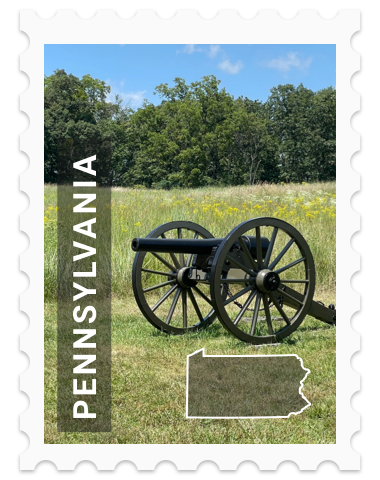Pennsylvania
Discover Pennsylvania

Capital
Harrisburg
Statehood
December 12, 1787
The history of Pennsylvania, often referred to as the "Keystone State," is a captivating chronicle that encapsulates the American experience. Founded in 1681 by William Penn as a haven for Quakers seeking religious freedom and tolerance, the colony attracted a diverse group of settlers from Europe, creating a cultural melting pot.
During the American Revolution, Pennsylvania played a pivotal role, hosting the Continental Congress in Philadelphia where the Declaration of Independence and the U.S. Constitution were drafted and adopted. The state's strategic location, with Valley Forge as a notable site, made it central to the war effort.
In the 19th century, Pennsylvania's industrial might soared. The state was a leader in steel production, thanks to the innovations of figures like Andrew Carnegie. It was also a hotbed of labor activism, exemplified by events like the Homestead Strike.
Today, Pennsylvania's historical landmarks, from Independence Hall to Gettysburg National Military Park, offer glimpses into its vital role in American history. Its cities, including Philadelphia and Pittsburgh, continue to thrive as hubs of culture, industry, and education, embodying the legacy of a state that has shaped the nation in profound ways.
Source ChatGPT
Major Airports
Lehigh Valley International Airport

Elevation
120 m
Opened
1929
Runways
2
Philadelphia International Airport

Elevation
11 m
Opened
1925
Runways
4
Pittsburgh International Airport

Elevation
366 m
Opened
1952
Runways
4
Sticker Collection

B. Free Franklin Post Office
Visit the only colonial-themed post office still in operation today by the United States Postal Service.

Betsy Ross House
The home that is believed to be the location where Betsy Ross sewed the first American flag.

Carpenter's Historic Hall
Constructed in 1770, the hall was the location of the First Continental Congress in 1774.

Christ Church
From 1754 to 1810, the church's tower and steeple was the tallest structure in what is now the United States.

Christ Church Burial Ground
Visit the resting place of Benjamin Franklin, and his wife, Deborah.

Elfreth's Alley
Wander this historic street with 32 homes dated between 1703 and 1836.

Gettysburg
A 3-day battle that would become the turning point for the Union’s victory in the Civil War.

Independence Hall
The location of both the signing of the Declaration of Independence and the US Constitution.

Liberty Bell
The famous cracked bell symbolizing American independence

President's House
Home to George Washington and John Adams during their presidencies.





